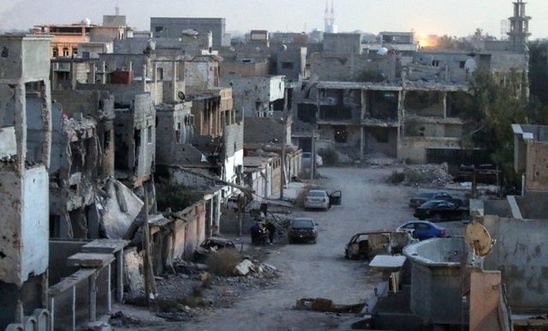
Press releases
Libya: children reduced to 'skin and bones' by military blockade of Benghazi

Electricity cut off for past two years, food running out
‘While bombs and shells continue to rain down on them, civilians are struggling to survive on rotten food and dirty water’ - Magdalena Mughrabi
Fears are growing for hundreds of civilians trapped in a section of the city of Benghazi which faces intensified fighting after several months under military blockade, Amnesty International said today.
The organisation has gathered testimony from some of the 130 Libyan families and hundreds of foreign nationals who have been trapped for months in the residential district of Ganfouda, in south-west Benghazi. All entry roads are blocked by the fighting or by the Libyan National Army - and food, water and electricity supplies have been cut off.
Lack of a phone signal in many parts of Ganfouda has made it difficult for those trapped to make contact with the outside world, with their relatives unaware whether they’re still alive
Civilians are also afraid they may be subjected to attacks based on their perceived support for Islamist armed groups, after a tribal leader affiliated with an anti-Islamist military operation (see below) said at the end of August that any person over the age of 14 should not be allowed to leave Ganfouda alive.
One resident, Mohamed, has told Amnesty that airstrikes and artillery shelling have intensified and moved closer over the past week. He described how constant, indiscriminate shelling and lack of electricity - which has been cut off for over two years - has left them huddled at home in the dark. “It’s like we’re in prison,” he said. He spoke of the desperate need for humanitarian supplies, especially for children, and said any available flour, rice and oil had all expired, while a lack of cooking fuel meant they had to cook in a wheelbarrow filled with coal. Mohamed has a kidney problem, but the medicine he needs to treat this has run out. Meanwhile, his family have taken in eight other families who fled the fighting, and around 45 people - including 23 children - are now living in very cramped conditions in his house. He said:
“Children look like skin and bones because of the lack of food and poor nutrition … If they could just drop us some food for the children or get them out of here, even if that meant leaving the rest of us, that would be fine. There are no fighters amongst us: we’re just normal civilians.”
“We just want a safe way to leave,” said another resident trapped in Ganfouda, who asked that his name wasn’t made public. “I have two sons,” he added, “one is three-and-a-half and the other is two years old. There is no baby milk or food for them. I have to fill bottles with water and fool them into thinking it’s milk.”
As well as a lack of basic supplies, people are living in constant fear of airstrikes and shelling, with many saying they’re too scared to leave their homes. One of the civilians Amnesty had been in contact with inside Ganfouda, Tarik Gaoda, was killed in an airstrike on 1 July alongside his 80-year-old father.
Amnesty International’s Middle East and North Africa Deputy Director Magdalena Mughrabi said:
“Time is running out for civilians in Ganfouda, who are being left to die trapped by the fighting.“While bombs and shells continue to rain down on them, civilians are struggling to survive on rotten food and dirty water. And the sick and wounded must make do with dwindling supplies of expired medicines.“All sides should be facilitating the delivery of aid and granting civilians who wish to leave the area safe passage. Civilians should not be used as human shields, and those who wish to leave must be protected from arbitrary detention, torture or any other abuses.”
Hostages and foreign nationals among those trapped
Amnesty has expressed concern for an estimated 130 detainees who were abducted by the armed group Ansar al-Sharia in 2014 and are also trapped under fire in Benghazi. Recent media reports, which have not been independently verified, suggest that as many as 20 detainees may have been killed in airstrikes, with photos of their dead bodies shared online.
Hundreds of foreign nationals, including Sudanese, Chadian and Bangladeshi migrant workers, are also believed to be amongst those trapped. According to media reports, at least five Sudanese nationals were killed in an airstrike in mid-August. Ganfouda residents interviewed by Amnesty have also said that foreign nationals were amongst those killed in recent airstrikes.
The ‘Operation Dignity’ offensive
A military offensive named Operation Dignity was launched in mid-2014 by former General Khalifa Haftar against Islamist militias and armed groups in Benghazi, which later formed a coalition known as the Shura Council of Benghazi Revolutionaries. Two years on, the Libyan National Army under General Haftar’s command is carrying out repeated air strikes on areas under Shura Council control in Benghazi - namely Ganfouda and other smaller pockets in the city - endangering the lives of civilians. Haftar’s forces have also restricted access into and escape from Ganfouda, leaving many people pinned down by airstrikes.